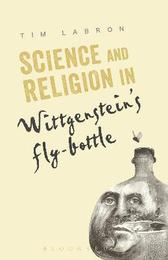
|
Science and Religion in Wittgenstein's Fly-Bottle
Paperback / softback
Main Details
| Title |
Science and Religion in Wittgenstein's Fly-Bottle
|
| Authors and Contributors |
By (author) Dr. Tim Labron
|
| Physical Properties |
| Format:Paperback / softback | | Pages:152 | | Dimensions(mm): Height 216,Width 140 |
|
| Category/Genre | Philosophy of religion |
|---|
| ISBN/Barcode |
9781441151193
|
| Classifications | Dewey:192 |
|---|
| Audience | | Professional & Vocational | | Tertiary Education (US: College) | |
|---|
|
Publishing Details |
| Publisher |
Bloomsbury Publishing Plc
|
| Imprint |
Bloomsbury Academic USA
|
| Publication Date |
21 September 2017 |
| Publication Country |
United States
|
Description
Are science and religion in accord or are they diametrically opposed to each other? The common perspectives-for or against religion-are based on the same question, "Do religion and science fit together or not?" These arguments are usually stuck within a preconceived notion of realism which assumes that there is a 'true reality' that is independent of us and is that which we discover. However, this context confuses our understanding of both science and religion. The core concern is not the relation between science and religion, it is realism in science and religion. Wittgenstein's philosophy and developments in quantum theory can help us to untie the knots in our preconceived realism and, as Wittgenstein would say, show the fly out of the bottle. This point of view changes the discussion from science and religion competing for the discovery of the 'true reality' external to us (realism), and from claiming that reality is simply whatever we pragmatically think it is (nonrealism), to realizing the nature and interdependence of reality, language, and information in science and religion.
Author Biography
Tim Labron is Professor of Philosophy and Religious Studies at Concordia University of Edmonton, Canada.
Reviews[A] good contribution to considerations of the relation between science and religion. * The Journal of Religion * By the end of the book, one grasps a unique philosophical approach to reality itself. This alone is well worth the trip. * Notre Dame Philosophical Reviews * In an academic environment in which the name of Wittgenstein is piously honoured but his way of doing philosophy seldom put into practice, it is a pleasure to welcome Tim Labron's intervention: this lucidly argued, very readable and accessible study of much the same deep questions and permanently tempting muddles that Wittgenstein taught us how to deal with all these years ago, exposed here and resisted with such wonderful patience and clarity. * Fergus Kerr, Honorary Fellow in the School of Divinity, University of Edinburgh, UK * If the enemy of one's enemy is a friend, then Tim Labron has done us the great service of introducing readers to two friends whose writings expose confusions that have bewitched our contemporary culture just to the extent that we proudly consider ourselves 'scientific.' Labron endeavors to show how philosopher Ludwig Wittgenstein and quantum physicist Niels Bohr, in complementary ways, unravel the tangled skein of scientific reductionism. This richly researched volume will bring to light a radical alternative to the popular 'conflict model' that presumes science cannot help but be pitted against religion. Once the alternative model has cleared away the confusions, religion is relieved of the burden of striving for standards that science itself cannot meet precisely because those standards are unintelligible. * Brad J. Kallenberg, Professor of Theology & Ethics, University of Dayton, USA * Labron has written a stimulating but accessible book on the supposed conflict between religion and science. He shows that the real issue is not some inevitable conflict between religion and science, but is rather a problem with clarifying for ourselves what realism in each area properly amounts to. Although Labron employs a variety of Wittgensteinian techniques in his discussion, he nowhere loses contact with the level at which the discussion matters most-the level of popular religion and popular science. He does not leave the discussion at that level but manages to lift it without losing his audience. It is worth mentioning too that Labron employs Wittgensteinian techniques but his goal is to show the fly the way out of the fly-bottle, not to entrap the fly in some form of Wittgensteinian fideism. * Kelly Dean Jolley, Goodwin Philpott Profoessor of Religion and Philosophy, Auburn University, USA * Tim Labron issues a refreshing and provocative call to exorcise a false gulf between the person and 'external reality,' and instead recognise how we participate in a reality which is too great, 'rough,' and 'dappled,' to be neatly reduced to simple foundations and rigid ideal laws. He invites us not only to 'escape from the fly-bottle,' but also to 'think outside the post-Cartesian box.' * Richard Conrad, OP, Director of the Aquinas Institute, Blackfriars, Oxford, UK *
|